A good book timely placed in the right hands can change the course of a life and ministry. At For the Church, we believe in the ministry of good books for the sake of the Church—which is why we’re excited to present to you the 2024 For the Church Book Awards. For our eighth annual FTC Book Awards, members of our FTC council, editorial staff, and seminary community chose two books—a winner and a runner-up—to honor and to recommend to you for the way they impacted them personally and/or offered a significant contribution to the Church and her pursuit of a gospel-centered life and ministry.
Congratulations to this year’s winners of the 2024 For the Church Book Awards!
Dr. Jason K. Allen, President of Midwestern Seminary and FTC Editor-in-Chief
Winner: The Army of God: Spurgeon’s Vision for the Church by Geoff Chang (Mentor)
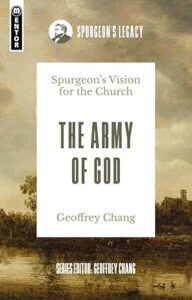 “The immortal Charles Spurgeon was many things—powerful preacher, fervent evangelist, fearless apologist, prolific author, and dynamic leader all rolled into one. But at the center of his ministerial heart was, perhaps, one virtuous gifting above all else— a devoted pastor. Indeed, so many of Spurgeon’s ministry pursuits and so much of his ministry influence flowed from his primary work of shepherding the flock of God entrusted to him. Spurgeon’s heart for the local church, and the ecclesiological convictions that undergirded it, are an enduring distinctive of the great man’s ministry. That’s why the 21st century pastor will benefit from studying Spurgeon’s ecclesiological convictions and well-documented pastoral ministry. And that’s also why I’m grateful for Geoff Chang’s The Army of God: Spurgeon’s Vision for the Church, in which he sets forth, in easy-to-read format, Spurgeon’s local-church convictions and practice. I heartily commend this book to all who serve God’s people. .”
“The immortal Charles Spurgeon was many things—powerful preacher, fervent evangelist, fearless apologist, prolific author, and dynamic leader all rolled into one. But at the center of his ministerial heart was, perhaps, one virtuous gifting above all else— a devoted pastor. Indeed, so many of Spurgeon’s ministry pursuits and so much of his ministry influence flowed from his primary work of shepherding the flock of God entrusted to him. Spurgeon’s heart for the local church, and the ecclesiological convictions that undergirded it, are an enduring distinctive of the great man’s ministry. That’s why the 21st century pastor will benefit from studying Spurgeon’s ecclesiological convictions and well-documented pastoral ministry. And that’s also why I’m grateful for Geoff Chang’s The Army of God: Spurgeon’s Vision for the Church, in which he sets forth, in easy-to-read format, Spurgeon’s local-church convictions and practice. I heartily commend this book to all who serve God’s people. .”
Get the book here.
Runner-Up: Mere Christian Hermeneutics: Transfiguring What It Means to Read the Bible Theologically by Kevin J. Vanhoozer (Zondervan Academic)
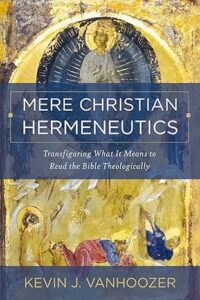 “Though conservative evangelicals have long affirmed the inspiration and inerrancy of Scripture, how to interpret Scripture remains an ongoing source of discussion and even debate. Kevin Vanhoozer’s Mere Christian Hermeneutics is a welcome contribution to this ongoing dialogue. Vanhoozer is a respected theologian and accomplished author who brings his considerable gifts to bear in this treatise on biblical interpretation. Whether you agree or disagree with Vanhoozer’s argument on reading the Bible theologically, all who seek to seriously engage the topic of biblical hermeneutics will benefit from his work.”
“Though conservative evangelicals have long affirmed the inspiration and inerrancy of Scripture, how to interpret Scripture remains an ongoing source of discussion and even debate. Kevin Vanhoozer’s Mere Christian Hermeneutics is a welcome contribution to this ongoing dialogue. Vanhoozer is a respected theologian and accomplished author who brings his considerable gifts to bear in this treatise on biblical interpretation. Whether you agree or disagree with Vanhoozer’s argument on reading the Bible theologically, all who seek to seriously engage the topic of biblical hermeneutics will benefit from his work.”
Get the book here.
Dr. Jason G. Duesing, Provost of Midwestern Seminary and FTC Editorial Council Member
Winner: The Mythmakers: The Remarkable Fellowship of C.S. Lewis and J.R.R. Tolkien by John Hendrix (Harry N. Abrams)

This is not your typical graphic novel. Well researched and engaging, The Mythmakers tells the story of the creative imaginings that served as the bond for Lewis and Tolkien’s friendship. Following their post-war careers in Oxford, Hendricks sheds new light on both the well known and less known aspects of the these Inklings—including even the fraying of their friendship in later years. Hendrix, a New York Times bestselling author and illustrator, serves as founding Chair of the Illustration and Visual Culture program at Washington University in St. Louis. This is a book to be read and shared—all who do will be surprised by joy.
Get the book here.
Runner-Up: Psalms in an Age of Distraction: Experiencing the Restorative Power of Biblical Poetry by Ethan C. Jones (Baker Academic)
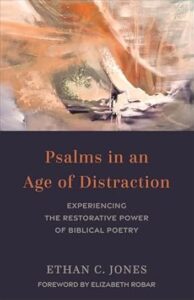 Ethan Jones clarifies, “This is not a book about digital media.” Indeed, it serves as a welcomed distraction from the devices that distract. This is a beautiful book about how the Psalms, as poetry, can teach, guide, shape the soul as well as shape churches. Jones, associate professor at New Orleans Baptist Theological Seminary, has written articles on this idea for a few years following service as a Visting Scholar at the University of Cambridge, and I am thrilled to see it come together in book form.
Ethan Jones clarifies, “This is not a book about digital media.” Indeed, it serves as a welcomed distraction from the devices that distract. This is a beautiful book about how the Psalms, as poetry, can teach, guide, shape the soul as well as shape churches. Jones, associate professor at New Orleans Baptist Theological Seminary, has written articles on this idea for a few years following service as a Visting Scholar at the University of Cambridge, and I am thrilled to see it come together in book form.
Get the book here.
Camden Pulliam, Senior Vice President for Institutional Relations at Midwestern Seminary and FTC Editorial Council Member
Winner: Mere Christian Hermeneutics: Transfiguring What It Means to Read the Bible Theologically by Kevin J. Vanhoozer (Zondervan Academic)
 “Most thinkers are either journalists or scholars. Journalists make complex things simple. Scholars make simple things complex. In Mere Christian Hermeneutics, Kevin Vanhoozer does both. He takes the complex biblical interpretation world and makes sense of it, while also bringing added depth and scholarship to otherwise assumed concepts (e.g. see Part 2 on defining “literal interpretation”). In this work, Vanhoozer attempts the unthinkable: a foundational hermeneutic of the Bible on which all Christians can agree. Whether he is successful, only time will tell. But in view of the fractured state of Christian hermeneutics, his attempt is welcomed with open arms. May the church and academy alike follow his lead and foster a community of readers who obey the Word unto love of God and love of neighbor.”
“Most thinkers are either journalists or scholars. Journalists make complex things simple. Scholars make simple things complex. In Mere Christian Hermeneutics, Kevin Vanhoozer does both. He takes the complex biblical interpretation world and makes sense of it, while also bringing added depth and scholarship to otherwise assumed concepts (e.g. see Part 2 on defining “literal interpretation”). In this work, Vanhoozer attempts the unthinkable: a foundational hermeneutic of the Bible on which all Christians can agree. Whether he is successful, only time will tell. But in view of the fractured state of Christian hermeneutics, his attempt is welcomed with open arms. May the church and academy alike follow his lead and foster a community of readers who obey the Word unto love of God and love of neighbor.”
Get the book here.
Runner-Up: Pilgrim Prayers: Devotional Poems That Awaken Your Heart to the Goodness, Greatness, and Glory of God (Zondervan)
 “While in seminary, a professor encouraged my preaching class to take up poetry to improve our preaching. Both tasks – poetry and preaching – give a sense of the significant with an eye towards style. Both tasks stir the heart and move the will. Thus, as a growing preacher myself, I was delighted to discover Tim Challies’ new book, Pilgrim Prayers. This book is filled with poem-prayers from prior generations. Each poem is accompanied with added commentary, devotional content, and Scripture reading. Whether you are a pastor hoping to improve your preaching or simply a Christ-follower looking for a new devotional, these poem-prayers will help you savor the Savior and declare his deeds. I hope you enjoy these wordy gifts as much as I have. (For a personal favorite from Challies’ selection, see “A Prayer of Confident Submission to God” authored by Christopher Newman Hall).”
“While in seminary, a professor encouraged my preaching class to take up poetry to improve our preaching. Both tasks – poetry and preaching – give a sense of the significant with an eye towards style. Both tasks stir the heart and move the will. Thus, as a growing preacher myself, I was delighted to discover Tim Challies’ new book, Pilgrim Prayers. This book is filled with poem-prayers from prior generations. Each poem is accompanied with added commentary, devotional content, and Scripture reading. Whether you are a pastor hoping to improve your preaching or simply a Christ-follower looking for a new devotional, these poem-prayers will help you savor the Savior and declare his deeds. I hope you enjoy these wordy gifts as much as I have. (For a personal favorite from Challies’ selection, see “A Prayer of Confident Submission to God” authored by Christopher Newman Hall).”
Get the book here.
Jared Wilson, Assistant Professor of Pastoral Ministry, Spurgeon College; Author in Residence, and FTC Editorial Council Member
Winner: Proclaiming Christ in a Pluralistic Age by J.I. Packer (Crossway)
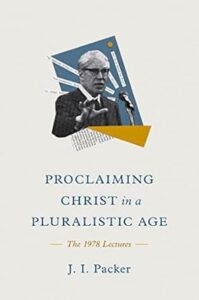 “These 1978 lectures published this year for the first time stand as yet another example of the treasure the late J.I. Packer was to evangelicalism. The subjects covered—Christ’s humanity and divinity, the biblical foundations of penal substitutionary atonement, the historicity and power of Christ’s resurrection—should not be the least bit controversial in the Christian tradition, but Packer’s careful responses to the challenges to these truths (and more besides) delivered more than 40 years ago are just as relevant and vital to gospel ministry today. Few write about such depth with such clarity and humility. This book, the best I’ve read in 2024, is a beautiful refresher on gospel doctrine that will serve us all well in an age of continuing drift and distraction.”
“These 1978 lectures published this year for the first time stand as yet another example of the treasure the late J.I. Packer was to evangelicalism. The subjects covered—Christ’s humanity and divinity, the biblical foundations of penal substitutionary atonement, the historicity and power of Christ’s resurrection—should not be the least bit controversial in the Christian tradition, but Packer’s careful responses to the challenges to these truths (and more besides) delivered more than 40 years ago are just as relevant and vital to gospel ministry today. Few write about such depth with such clarity and humility. This book, the best I’ve read in 2024, is a beautiful refresher on gospel doctrine that will serve us all well in an age of continuing drift and distraction.”
Get the book here.
Runner-Up: A Bit of Earth: A Year in the Garden with God by Andrea Burke (Lexham Press)
 “One of the greatest needs in our day of information overload is the Christian who can communicate truth in both personal and artful ways, adorning the beauty of the gospel with beautiful prose. As she reflects on her own careful cultivation of her garden in upstate New York, teacher and author (and occasional For The Church contributor) Andrea Burke’s tender and devotionally rich writing in A Bit of Earth will cultivate vital growth in your own heart. This is, quite simply, a beautiful book.”
“One of the greatest needs in our day of information overload is the Christian who can communicate truth in both personal and artful ways, adorning the beauty of the gospel with beautiful prose. As she reflects on her own careful cultivation of her garden in upstate New York, teacher and author (and occasional For The Church contributor) Andrea Burke’s tender and devotionally rich writing in A Bit of Earth will cultivate vital growth in your own heart. This is, quite simply, a beautiful book.”
Get the book here.
Brett Fredenberg, Director of Marketing and Content Strategy and Managing Editor of For the Church
Winner: Daily Doctrine: A One-Year Guide to Systematic Theology by Kevin DeYoung (Crossway)
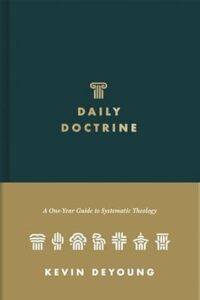 “Not only is Kevin DeYoung’s recent book Daily Doctrine a bulwark of truth for pastors and ministry leaders, it was a balm for my soul as well. Time would fail to mention just how broad a landscape DeYoung covers in this guide, and for fear of leaving off such important doctrines I wouldn’t dare begin to summarize. For me, the theological precision of his work on the doctrine of Christology, his biblical and historical sourcing for the doctrine of the Trinity, and his section on salvation was worth the price of the book by themselves. Many people may ask: ‘What’s the point of theology?’ Kevin DeYoung’s book responds by modeling what Andrew Bonar knew to be true: ‘Doctrine is practical, for it is that that stirs up the heart.’ Pick up this book and you’ll find yourself returning to its contents years down the road, for your own life and the life of your people.
“Not only is Kevin DeYoung’s recent book Daily Doctrine a bulwark of truth for pastors and ministry leaders, it was a balm for my soul as well. Time would fail to mention just how broad a landscape DeYoung covers in this guide, and for fear of leaving off such important doctrines I wouldn’t dare begin to summarize. For me, the theological precision of his work on the doctrine of Christology, his biblical and historical sourcing for the doctrine of the Trinity, and his section on salvation was worth the price of the book by themselves. Many people may ask: ‘What’s the point of theology?’ Kevin DeYoung’s book responds by modeling what Andrew Bonar knew to be true: ‘Doctrine is practical, for it is that that stirs up the heart.’ Pick up this book and you’ll find yourself returning to its contents years down the road, for your own life and the life of your people.
Get the book here.
Runner-Up: To Gaze Upon God by Samuel G. Parkison (IVP Academic)
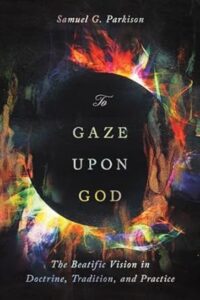 “Hans Boersma writes in his endorsement of Parkison’s book, ‘This is easily the best primer on the beatific vision today.” In other words, this is easily the best primer today on one of the most important doctrines for the Church. The beatific vision is the Christian’s hope of seeing God face to face—a doctrine which has been forgotten for far too long. Parkison’s book gives a comprehensive treatment of the beatific vision, from its biblical basis and historical foundation to retrieval in evangelicalism and application in the Christian life, in order to raise the Christian’s eyes to a hope far above the woes and wiles of our everyday experience. Read this book and be reminded and renewed in your hope of being with your God fully as we were always meant to be.
“Hans Boersma writes in his endorsement of Parkison’s book, ‘This is easily the best primer on the beatific vision today.” In other words, this is easily the best primer today on one of the most important doctrines for the Church. The beatific vision is the Christian’s hope of seeing God face to face—a doctrine which has been forgotten for far too long. Parkison’s book gives a comprehensive treatment of the beatific vision, from its biblical basis and historical foundation to retrieval in evangelicalism and application in the Christian life, in order to raise the Christian’s eyes to a hope far above the woes and wiles of our everyday experience. Read this book and be reminded and renewed in your hope of being with your God fully as we were always meant to be.
Get the book here.
Michaela Classen, Associate Editor at For the Church
Winner: Delighting in the Old Testament: Through Christ and For Christ by Jason DeRouchie (Crossway)
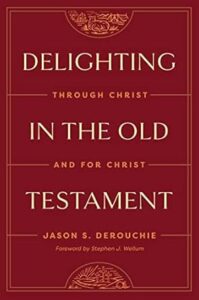 “When we behold Christ, we are transformed. In Delighting in the Old Testament, Jason DeRouchie shows us Christ throughout the pages of the Old Testament, transforming our understanding of the Old Testament to see its unified storyline that points to salvation in Jesus. DeRouchie presents a thorough, biblical case, carefully showing how the Old and New Testaments work together to proclaim Christ and are rightly understood in light of Him. DeRouchie also applies this foundation to interpret Old Testament laws and promises for believers today. Though his work is an excellent resource for students, his writing is accessible to a wide audience, with clear Scripture references and helpful graphics. Delighting in the Old Testament helps Christians read their Bible and see their Savior who loved them before the foundation of the world. In this way, the book is truly for the Church.”
“When we behold Christ, we are transformed. In Delighting in the Old Testament, Jason DeRouchie shows us Christ throughout the pages of the Old Testament, transforming our understanding of the Old Testament to see its unified storyline that points to salvation in Jesus. DeRouchie presents a thorough, biblical case, carefully showing how the Old and New Testaments work together to proclaim Christ and are rightly understood in light of Him. DeRouchie also applies this foundation to interpret Old Testament laws and promises for believers today. Though his work is an excellent resource for students, his writing is accessible to a wide audience, with clear Scripture references and helpful graphics. Delighting in the Old Testament helps Christians read their Bible and see their Savior who loved them before the foundation of the world. In this way, the book is truly for the Church.”
Get the book here.
Runner-up: Reclaiming the “Dark Ages”: How the Gospel Shone from 500 to 1500 by Iain Wright (Christian Focus)
 “In no period of history has Christ abandoned His bride. Reclaiming the Dark Ages offers a testimony to that fact. Peering into the period of our history between the early church and the Protestant Reformation, a millennium often characterized as spiritually and intellectually lost, authors Iain Wright and Yannick Imbert give us a glimpse of the light of true faith enduring over the generations. Each chapter presents a biographical sketch of 10 key figures, including Boethius, Anselm of Canterbury, and John Wycliffe, and an account of each one’s contributions to theological orthodoxy. Though some readers may benefit from additional reading to fully appreciate the theological context and controversies in each figure’s story, the book is an accessible entry point to this period of Church history and an encouraging reminder of God’s faithfulness to build His Church.”
“In no period of history has Christ abandoned His bride. Reclaiming the Dark Ages offers a testimony to that fact. Peering into the period of our history between the early church and the Protestant Reformation, a millennium often characterized as spiritually and intellectually lost, authors Iain Wright and Yannick Imbert give us a glimpse of the light of true faith enduring over the generations. Each chapter presents a biographical sketch of 10 key figures, including Boethius, Anselm of Canterbury, and John Wycliffe, and an account of each one’s contributions to theological orthodoxy. Though some readers may benefit from additional reading to fully appreciate the theological context and controversies in each figure’s story, the book is an accessible entry point to this period of Church history and an encouraging reminder of God’s faithfulness to build His Church.”
Get the book here.
Levi Moore, Manager, Sword & Trowel Bookstore and Tomlinson Cafe
Winner: Delighting in the Old Testament: Through Christ and For Christ by Jason DeRouchie (Crossway)
 “Delighting in Scripture is a wonderful privilege of the disciples of Jesus Christ. The Gospels introduce sinners to their Savior, but they do not tell the whole story as to why we need a Savior. Moreover, many Christians neglect the first thirty-nine books of the Bible. DeRouchie’s work, Delighting in the Old Testament, lays out a simple and applicable method to aid the Church in taking joy in the foundational text to the New Testament. Even in the Old Testament, Jesus is made to be central to understanding the text. As such, Jesus helps us to read well, see well, hope well, and live well. With the for the Church mission in mind, this work is designed to be used by individuals and groups alike.”
“Delighting in Scripture is a wonderful privilege of the disciples of Jesus Christ. The Gospels introduce sinners to their Savior, but they do not tell the whole story as to why we need a Savior. Moreover, many Christians neglect the first thirty-nine books of the Bible. DeRouchie’s work, Delighting in the Old Testament, lays out a simple and applicable method to aid the Church in taking joy in the foundational text to the New Testament. Even in the Old Testament, Jesus is made to be central to understanding the text. As such, Jesus helps us to read well, see well, hope well, and live well. With the for the Church mission in mind, this work is designed to be used by individuals and groups alike.”
Get the book here.
Runner-Up: Daily Doctrine: A One-Year Guide to Systematic Theology by Kevin DeYoung (Crossway)
 “People are often averse to those things that are most foreign or that appear too difficult. Though doctrine may seem dense and difficult to understand, DeYoung offers an approachable explanation of systematic theology. While this work can be read straight through or used as a small reference, it is meant to be read as part of a daily devotional that breaks down deep doctrine into a page or two and avoids using complex language. This book advances the for the Church mission in helping the layman digest doctrine in a succinct and edifying way.”
“People are often averse to those things that are most foreign or that appear too difficult. Though doctrine may seem dense and difficult to understand, DeYoung offers an approachable explanation of systematic theology. While this work can be read straight through or used as a small reference, it is meant to be read as part of a daily devotional that breaks down deep doctrine into a page or two and avoids using complex language. This book advances the for the Church mission in helping the layman digest doctrine in a succinct and edifying way.”
Get the book here.
Once again, we would like to extend a congratulations to the authors and publishers represented in the 2024 For the Church Book Awards. You can view previous winners of the FTC Book Awards here: 2022, 2021, 2020, 2019, 2018, 2017.


 “The immortal Charles Spurgeon was many things—powerful preacher, fervent evangelist, fearless apologist, prolific author, and dynamic leader all rolled into one. But at the center of his ministerial heart was, perhaps, one virtuous gifting above all else— a devoted pastor. Indeed, so many of Spurgeon’s ministry pursuits and so much of his ministry influence flowed from his primary work of shepherding the flock of God entrusted to him. Spurgeon’s heart for the local church, and the ecclesiological convictions that undergirded it, are an enduring distinctive of the great man’s ministry. That’s why the 21st century pastor will benefit from studying Spurgeon’s ecclesiological convictions and well-documented pastoral ministry. And that’s also why I’m grateful for Geoff Chang’s The Army of God: Spurgeon’s Vision for the Church, in which he sets forth, in easy-to-read format, Spurgeon’s local-church convictions and practice. I heartily commend this book to all who serve God’s people. .”
“The immortal Charles Spurgeon was many things—powerful preacher, fervent evangelist, fearless apologist, prolific author, and dynamic leader all rolled into one. But at the center of his ministerial heart was, perhaps, one virtuous gifting above all else— a devoted pastor. Indeed, so many of Spurgeon’s ministry pursuits and so much of his ministry influence flowed from his primary work of shepherding the flock of God entrusted to him. Spurgeon’s heart for the local church, and the ecclesiological convictions that undergirded it, are an enduring distinctive of the great man’s ministry. That’s why the 21st century pastor will benefit from studying Spurgeon’s ecclesiological convictions and well-documented pastoral ministry. And that’s also why I’m grateful for Geoff Chang’s The Army of God: Spurgeon’s Vision for the Church, in which he sets forth, in easy-to-read format, Spurgeon’s local-church convictions and practice. I heartily commend this book to all who serve God’s people. .” “Though conservative evangelicals have long affirmed the inspiration and inerrancy of Scripture, how to interpret Scripture remains an ongoing source of discussion and even debate. Kevin Vanhoozer’s Mere Christian Hermeneutics is a welcome contribution to this ongoing dialogue. Vanhoozer is a respected theologian and accomplished author who brings his considerable gifts to bear in this treatise on biblical interpretation. Whether you agree or disagree with Vanhoozer’s argument on reading the Bible theologically, all who seek to seriously engage the topic of biblical hermeneutics will benefit from his work.”
“Though conservative evangelicals have long affirmed the inspiration and inerrancy of Scripture, how to interpret Scripture remains an ongoing source of discussion and even debate. Kevin Vanhoozer’s Mere Christian Hermeneutics is a welcome contribution to this ongoing dialogue. Vanhoozer is a respected theologian and accomplished author who brings his considerable gifts to bear in this treatise on biblical interpretation. Whether you agree or disagree with Vanhoozer’s argument on reading the Bible theologically, all who seek to seriously engage the topic of biblical hermeneutics will benefit from his work.”
 Ethan Jones clarifies, “This is not a book about digital media.” Indeed, it serves as a welcomed distraction from the devices that distract. This is a beautiful book about how the Psalms, as poetry, can teach, guide, shape the soul as well as shape churches. Jones, associate professor at New Orleans Baptist Theological Seminary, has written articles on this idea for a few years following service as a Visting Scholar at the University of Cambridge, and I am thrilled to see it come together in book form.
Ethan Jones clarifies, “This is not a book about digital media.” Indeed, it serves as a welcomed distraction from the devices that distract. This is a beautiful book about how the Psalms, as poetry, can teach, guide, shape the soul as well as shape churches. Jones, associate professor at New Orleans Baptist Theological Seminary, has written articles on this idea for a few years following service as a Visting Scholar at the University of Cambridge, and I am thrilled to see it come together in book form. “While in seminary, a professor encouraged my preaching class to take up poetry to improve our preaching. Both tasks – poetry and preaching – give a sense of the significant with an eye towards style. Both tasks stir the heart and move the will. Thus, as a growing preacher myself, I was delighted to discover Tim Challies’ new book, Pilgrim Prayers. This book is filled with poem-prayers from prior generations. Each poem is accompanied with added commentary, devotional content, and Scripture reading. Whether you are a pastor hoping to improve your preaching or simply a Christ-follower looking for a new devotional, these poem-prayers will help you savor the Savior and declare his deeds. I hope you enjoy these wordy gifts as much as I have. (For a personal favorite from Challies’ selection, see “A Prayer of Confident Submission to God” authored by Christopher Newman Hall).”
“While in seminary, a professor encouraged my preaching class to take up poetry to improve our preaching. Both tasks – poetry and preaching – give a sense of the significant with an eye towards style. Both tasks stir the heart and move the will. Thus, as a growing preacher myself, I was delighted to discover Tim Challies’ new book, Pilgrim Prayers. This book is filled with poem-prayers from prior generations. Each poem is accompanied with added commentary, devotional content, and Scripture reading. Whether you are a pastor hoping to improve your preaching or simply a Christ-follower looking for a new devotional, these poem-prayers will help you savor the Savior and declare his deeds. I hope you enjoy these wordy gifts as much as I have. (For a personal favorite from Challies’ selection, see “A Prayer of Confident Submission to God” authored by Christopher Newman Hall).” “These 1978 lectures published this year for the first time stand as yet another example of the treasure the late J.I. Packer was to evangelicalism. The subjects covered—Christ’s humanity and divinity, the biblical foundations of penal substitutionary atonement, the historicity and power of Christ’s resurrection—should not be the least bit controversial in the Christian tradition, but Packer’s careful responses to the challenges to these truths (and more besides) delivered more than 40 years ago are just as relevant and vital to gospel ministry today. Few write about such depth with such clarity and humility. This book, the best I’ve read in 2024, is a beautiful refresher on gospel doctrine that will serve us all well in an age of continuing drift and distraction.”
“These 1978 lectures published this year for the first time stand as yet another example of the treasure the late J.I. Packer was to evangelicalism. The subjects covered—Christ’s humanity and divinity, the biblical foundations of penal substitutionary atonement, the historicity and power of Christ’s resurrection—should not be the least bit controversial in the Christian tradition, but Packer’s careful responses to the challenges to these truths (and more besides) delivered more than 40 years ago are just as relevant and vital to gospel ministry today. Few write about such depth with such clarity and humility. This book, the best I’ve read in 2024, is a beautiful refresher on gospel doctrine that will serve us all well in an age of continuing drift and distraction.” “One of the greatest needs in our day of information overload is the Christian who can communicate truth in both personal and artful ways, adorning the beauty of the gospel with beautiful prose. As she reflects on her own careful cultivation of her garden in upstate New York, teacher and author (and occasional For The Church contributor) Andrea Burke’s tender and devotionally rich writing in A Bit of Earth will cultivate vital growth in your own heart. This is, quite simply, a beautiful book.”
“One of the greatest needs in our day of information overload is the Christian who can communicate truth in both personal and artful ways, adorning the beauty of the gospel with beautiful prose. As she reflects on her own careful cultivation of her garden in upstate New York, teacher and author (and occasional For The Church contributor) Andrea Burke’s tender and devotionally rich writing in A Bit of Earth will cultivate vital growth in your own heart. This is, quite simply, a beautiful book.” “Not only is Kevin DeYoung’s recent book Daily Doctrine a bulwark of truth for pastors and ministry leaders, it was a balm for my soul as well. Time would fail to mention just how broad a landscape DeYoung covers in this guide, and for fear of leaving off such important doctrines I wouldn’t dare begin to summarize. For me, the theological precision of his work on the doctrine of Christology, his biblical and historical sourcing for the doctrine of the Trinity, and his section on salvation was worth the price of the book by themselves. Many people may ask: ‘What’s the point of theology?’ Kevin DeYoung’s book responds by modeling what Andrew Bonar knew to be true: ‘Doctrine is practical, for it is that that stirs up the heart.’ Pick up this book and you’ll find yourself returning to its contents years down the road, for your own life and the life of your people.
“Not only is Kevin DeYoung’s recent book Daily Doctrine a bulwark of truth for pastors and ministry leaders, it was a balm for my soul as well. Time would fail to mention just how broad a landscape DeYoung covers in this guide, and for fear of leaving off such important doctrines I wouldn’t dare begin to summarize. For me, the theological precision of his work on the doctrine of Christology, his biblical and historical sourcing for the doctrine of the Trinity, and his section on salvation was worth the price of the book by themselves. Many people may ask: ‘What’s the point of theology?’ Kevin DeYoung’s book responds by modeling what Andrew Bonar knew to be true: ‘Doctrine is practical, for it is that that stirs up the heart.’ Pick up this book and you’ll find yourself returning to its contents years down the road, for your own life and the life of your people. “Hans Boersma writes in his endorsement of Parkison’s book, ‘This is easily the best primer on the beatific vision today.” In other words, this is easily the best primer today on one of the most important doctrines for the Church. The beatific vision is the Christian’s hope of seeing God face to face—a doctrine which has been forgotten for far too long. Parkison’s book gives a comprehensive treatment of the beatific vision, from its biblical basis and historical foundation to retrieval in evangelicalism and application in the Christian life, in order to raise the Christian’s eyes to a hope far above the woes and wiles of our everyday experience. Read this book and be reminded and renewed in your hope of being with your God fully as we were always meant to be.
“Hans Boersma writes in his endorsement of Parkison’s book, ‘This is easily the best primer on the beatific vision today.” In other words, this is easily the best primer today on one of the most important doctrines for the Church. The beatific vision is the Christian’s hope of seeing God face to face—a doctrine which has been forgotten for far too long. Parkison’s book gives a comprehensive treatment of the beatific vision, from its biblical basis and historical foundation to retrieval in evangelicalism and application in the Christian life, in order to raise the Christian’s eyes to a hope far above the woes and wiles of our everyday experience. Read this book and be reminded and renewed in your hope of being with your God fully as we were always meant to be. “When we behold Christ, we are transformed. In Delighting in the Old Testament, Jason DeRouchie shows us Christ throughout the pages of the Old Testament, transforming our understanding of the Old Testament to see its unified storyline that points to salvation in Jesus. DeRouchie presents a thorough, biblical case, carefully showing how the Old and New Testaments work together to proclaim Christ and are rightly understood in light of Him. DeRouchie also applies this foundation to interpret Old Testament laws and promises for believers today. Though his work is an excellent resource for students, his writing is accessible to a wide audience, with clear Scripture references and helpful graphics. Delighting in the Old Testament helps Christians read their Bible and see their Savior who loved them before the foundation of the world. In this way, the book is truly for the Church.”
“When we behold Christ, we are transformed. In Delighting in the Old Testament, Jason DeRouchie shows us Christ throughout the pages of the Old Testament, transforming our understanding of the Old Testament to see its unified storyline that points to salvation in Jesus. DeRouchie presents a thorough, biblical case, carefully showing how the Old and New Testaments work together to proclaim Christ and are rightly understood in light of Him. DeRouchie also applies this foundation to interpret Old Testament laws and promises for believers today. Though his work is an excellent resource for students, his writing is accessible to a wide audience, with clear Scripture references and helpful graphics. Delighting in the Old Testament helps Christians read their Bible and see their Savior who loved them before the foundation of the world. In this way, the book is truly for the Church.” “In no period of history has Christ abandoned His bride. Reclaiming the Dark Ages offers a testimony to that fact. Peering into the period of our history between the early church and the Protestant Reformation, a millennium often characterized as spiritually and intellectually lost, authors Iain Wright and Yannick Imbert give us a glimpse of the light of true faith enduring over the generations. Each chapter presents a biographical sketch of 10 key figures, including Boethius, Anselm of Canterbury, and John Wycliffe, and an account of each one’s contributions to theological orthodoxy. Though some readers may benefit from additional reading to fully appreciate the theological context and controversies in each figure’s story, the book is an accessible entry point to this period of Church history and an encouraging reminder of God’s faithfulness to build His Church.”
“In no period of history has Christ abandoned His bride. Reclaiming the Dark Ages offers a testimony to that fact. Peering into the period of our history between the early church and the Protestant Reformation, a millennium often characterized as spiritually and intellectually lost, authors Iain Wright and Yannick Imbert give us a glimpse of the light of true faith enduring over the generations. Each chapter presents a biographical sketch of 10 key figures, including Boethius, Anselm of Canterbury, and John Wycliffe, and an account of each one’s contributions to theological orthodoxy. Though some readers may benefit from additional reading to fully appreciate the theological context and controversies in each figure’s story, the book is an accessible entry point to this period of Church history and an encouraging reminder of God’s faithfulness to build His Church.”